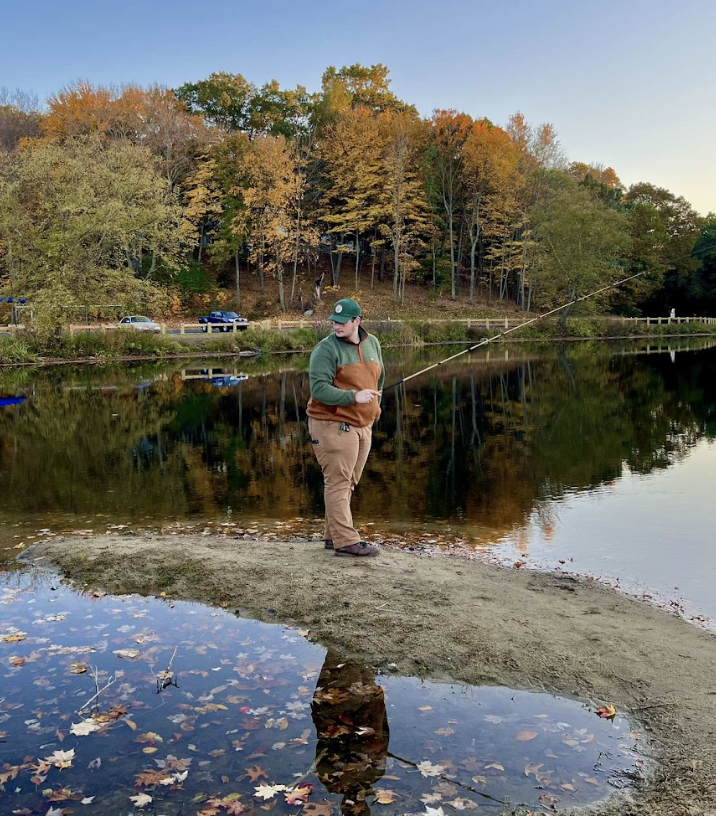Fishing: the answer to everything from primitive civilization to global survival
An interest in fishing may provoke a deeper appreciation for the natural world
December 7, 2022
If you have been a fairly steadfast reader of the Crier, you probably know by now that I am a fan of all things traditional. I prefer venison to turkey on the Thanksgiving table, wool to polyester in my closet, and it must be said, a brown ale to any hard seltzer in my fridge. However, I have not yet mentioned one of my favorite pastimes in any Crier articles in a good long while, so I think it is time I wrote about fishing and its broader implications on the state of the world as we know it.
In my amateur studies of the history of the human race, I have come to find that our most primitive ancestors often did not bother with hunting large game, and instead turned their attention to the water in search of food. Our most ancient ancestors, preferring not to be trampled or eaten by whatever they tried to hunt, gathered shellfish in the shallows and caught a plentiful bounty in the rivers, lakes, and oceans that so many people settled around. Put simply, fishing predates both hunting and farming livestock as a source of protein; and I still experience traces of that fact every time I look out across a body of water.
There is something intuitive, almost primal, about wanting to find out what lives beneath the surface of the water. Whether I am met with a mountain stream or the seemingly endless ocean, a part of me always envies the God-given power of Moses to part the waters; for now a fishing rod will have to suffice.
But I believe the ineptitude with which we must contend when it comes to fishing is what makes it such an appealing task. That primal curiosity with which we view the water will never be fulfilled, no matter how often we go cast a line or net, but when we lat that curiosity drive our pursuits, we can discover some truly incredible parts of the natural world.
Pulling a fish from the water is an amazing experience, no matter how many times you’ve done it. Fish of all kinds are incredibly strong and exceptionally pretty, a truly splendid reward after fighting the beast on the end of your line, even if you choose to catch and release your quarry as I so often do.
Of course there is some controversy in the community over what kind of fishing is best. I have been using spinning rods since before I could walk, and I am particularly fond of ice fishing in the winter as well, though this has proven to be a far more difficult activity thanks to climate change. However, I have recently taken up fly fishing, and have even used a simple hand line on many occasions. I have fished all kinds of waters, from local ponds to big lakes, rivers, and bays, and never been disappointed (I must admit my proneness to motion sickness has unfortunately prevented me from fishing on the open ocean). They all have their place, and are all thoroughly enjoyable to me. What I find most important is the simple act of getting out there and seeing if the fish are biting. Whether that means throwing a Walmart pole in the trunk and fishing from the parking lot of the local pond after work, or packing up an RV for a weekend in the mountains with a fly rod, the only thing that’s important is that you went fishing.
No matter what kind of fishing you enjoy, the quality and preservation of natural bodies of water is essential to our ability to catch quality fish, which brings me to another topic that may be a bit more universal, the state of our planet’s aquatic environment. As I am sure you are all aware, plastics, artificial chemicals, and all manner of human garbage have wound up polluting our water. The very ecosystems which allowed the first humans to thrive are now in jeopardy. This does not just harm our ability to take part in one of humanity’s oldest traditions, however; it is a problem which may have negative ramifications throughout society. The purity of drinking water is not a problem secluded to third-world countries anymore, as plastics and ‘forever-chemicals’ have been found in water supplies across the world, even in New Hampshire. Of course, pollution has also been detected in rain water, the very waters which are used to irrigate the farms and gardens that put food on our tables.
We have relied on the water for food, transportation, and comfort for longer than human memory can recount; why have we earned the right to pillage such a resource simply because we have the ability to? Maybe if we all took a moment to appreciate the natural world, and the wonders to be had beneath the waves and rapids, we would be more willing to accept the responsibility we have to preserve the planet which is sure to outlive us.



